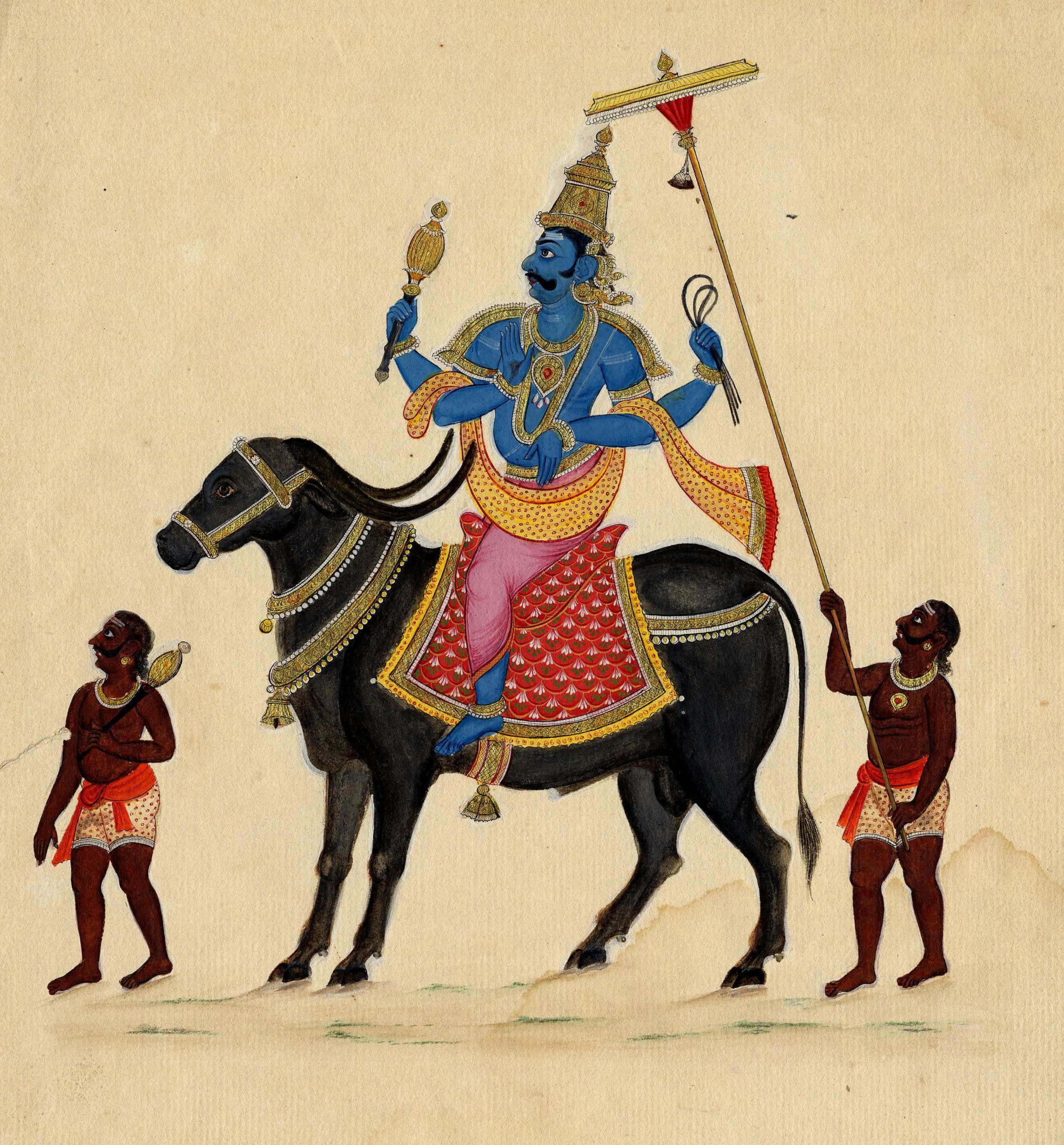|
Muisa
Muisa is the god of death and a major antagonist against Mwindo in Nyanga mythology. He is typically shown as greedy, cowardly, and manipulative. He is also the father of Kahindo, the goddess of luck. Mwindo Epic The culture hero Mwindo is out for revenge against his father, who escapes punishment by entering the underworld through a hole in the ground made from an uprooted kikota. He makes a deal with Muisa to harbor him there, but Mwindo follows him. Along the way, Mwindo meets Kahindo, who would be a beautiful young maiden if she wasn't covered in yaws and pus-filled sores. She falls in love with Mwindo and warns him that he must not accept food or drink from Muisa, or Mwindo will be forced to remain in the land of the dead forever, much like the Greek myth of Persephone. Before he leaves, Mwindo washes Kahindo's yaws. Mwindo meets with Muisa, who offers him a seat at his table which he declines. He then offers him banana pie (which is actually his feces) and banana beer (wh ... [...More Info...] [...Related Items...] OR: [Wikipedia] [Google] [Baidu] |
Mwindo
The ''Mwindo'' epic is an oral tale from the Congo told by the Nyanga people. The origins and creation of the Mwindo epic are mostly unknown since the story is only passed down orally. A version of the story was recorded by Kahombo Mateene and Daniel Biebuyck and published in 1969. Performance The Mwindo Epic, like many oral myths, is spoken as well as performed among gatherings of locals. The myth is performed mostly by a single bard wielding a calabash made into a rattle and donning various bells and other forms of noisemakers. To tell the story properly the bard acts out all the parts and does not refrain from being very animated in his dances and acting. It is not unusual for the bard to throw in some narrative not native to the story detailing his own life and his own personal experiences. The narrator is usually accompanied by four younger men who play on a percussion stick. Audience participation is important. The audience will often sing along with the narrator and the pe ... [...More Info...] [...Related Items...] OR: [Wikipedia] [Google] [Baidu] |
Nyanga People
The Nyanga (also ''Banianga'', ''Banyanga'', ''Kinyanga'', ''Nianga'' or ''Nyangas'') are a Bantu people in the African Great Lakes region. Today they live predominantly in the Kivu region of the Democratic Republic of the Congo, near the frontier with Rwanda and Uganda.James Stuart Olson, "Nyanga", ''The Peoples of Africa: An Ethnohistorical Dictionary'' (Greenwood Publishing Group, 1996), 454. They speak the Nyanga language, also called Kinyanga, which is one of the Bantu languages. There are about 150,000 speakers of Nyanga according to a 1994 census, but most are also fluent in Swahili. Their national epic is the karisi ''Mwindo The ''Mwindo'' epic is an oral tale from the Congo told by the Nyanga people. The origins and creation of the Mwindo epic are mostly unknown since the story is only passed down orally. A version of the story was recorded by Kahombo Mateene and Dan ...''. Notes Further reading *Biebuyck, Daniel P. ''De hond bij de Nyanga: ritueel en sociologie''. Ge ... [...More Info...] [...Related Items...] OR: [Wikipedia] [Google] [Baidu] |
Yaws
Yaws is a tropical infection of the skin, bones, and joints caused by the spirochete bacterium ''Treponema pallidum pertenue''. The disease begins with a round, hard swelling of the skin, in diameter. The center may break open and form an ulcer. This initial skin lesion typically heals after 3–6 months. After weeks to years, joints and bones may become painful, fatigue may develop, and new skin lesions may appear. The skin of the palms of the hands and the soles of the feet may become thick and break open. The bones (especially those of the nose) may become misshapen. After 5 years or more, large areas of skin may die, leaving scars. Yaws is spread by direct contact with the fluid from a lesion of an infected person. The contact is usually of a nonsexual nature. The disease is most common among children, who spread it by playing together. Other related treponemal diseases are bejel (''T. pallidum endemicum''), pinta (''T. carateum''), and syphilis (''T. p. pallidum''). Ya ... [...More Info...] [...Related Items...] OR: [Wikipedia] [Google] [Baidu] |
Persephone
In ancient Greek mythology and religion, Persephone ( ; gr, Περσεφόνη, Persephónē), also called Kore or Cora ( ; gr, Κόρη, Kórē, the maiden), is the daughter of Zeus and Demeter. She became the queen of the underworld after her abduction by and marriage to her uncle Hades, the king of the underworld.Martin Nilsson (1967). ''Die Geschichte der Griechische Religion'' Vol I pp 462–463, 479–480 The myth of her abduction, her sojourn in the underworld, and her temporary return to the surface represents her functions as the embodiment of spring and the personification of vegetation, especially grain crops, which disappear into the earth when sown, sprout from the earth in spring, and are harvested when fully grown. In Classical Greek art, Persephone is invariably portrayed robed, often carrying a sheaf of grain. She may appear as a mystical divinity with a sceptre and a little box, but she was mostly represented in the process of being carried off by Hades. ... [...More Info...] [...Related Items...] OR: [Wikipedia] [Google] [Baidu] |
Feces
Feces ( or faeces), known colloquially and in slang as poo and poop, are the solid or semi-solid remains of food that was not digested in the small intestine, and has been broken down by bacteria in the large intestine. Feces contain a relatively small amount of metabolic waste products such as bacterially altered bilirubin, and dead epithelial cells from the lining of the gut. Feces are discharged through the anus or cloaca during defecation. Feces can be used as fertilizer or soil conditioner in agriculture. They can also be burned as fuel or dried and used for construction. Some medicinal uses have been found. In the case of human feces, fecal transplants or fecal bacteriotherapy are in use. Urine and feces together are called excreta. Skatole is the principal compound responsible for the unpleasant smell of feces. Characteristics The distinctive odor of feces is due to skatole, and thiols (sulfur-containing compounds), as well as amines and carboxylic acids. Skatole ... [...More Info...] [...Related Items...] OR: [Wikipedia] [Google] [Baidu] |
Urine
Urine is a liquid by-product of metabolism in humans and in many other animals. Urine flows from the kidneys through the ureters to the urinary bladder. Urination results in urine being excretion, excreted from the body through the urethra. Cell (biology), Cellular metabolism generates many by-products that are rich in nitrogen and must be clearance (medicine), cleared from the Circulatory system, bloodstream, such as urea, uric acid, and creatinine. These by-products are expelled from the body during urination, which is the primary method for excreting water-soluble chemicals from the body. A urinalysis can detect nitrogenous wastes of the mammalian body. Urine plays an important role in the earth's nitrogen cycle. In balanced ecosystems, urine fertilizes the soil and thus helps plants to grow. Therefore, Reuse of excreta, urine can be used as a fertilizer. Some animals use it to territory (animal)#Scent marking, mark their territories. Historically, aged or fermented urine (kn ... [...More Info...] [...Related Items...] OR: [Wikipedia] [Google] [Baidu] |
Democratic Republic Of The Congo Literature
Democrat, Democrats, or Democratic may refer to: Politics *A proponent of democracy, or democratic government; a form of government involving rule by the people. *A member of a Democratic Party: **Democratic Party (United States) (D) **Democratic Party (Cyprus) (DCY) **Democratic Party (Japan) (DP) **Democratic Party (Italy) (PD) ** Democratic Party (Hong Kong) (DPHK) **Democratic Progressive Party (DPP) ** Democratic Party of Korea ** Democratic Party (other), for a full list *A member of a Democrat Party (other) *A member of a Democracy Party (other) *Australian Democrats, a political party * Democrats (Brazil), a political party *Democrats (Chile), a political party *Democrats (Croatia), a political party *Democrats (Gothenburg political party), in the city of Gothenburg, Sweden *Democrats (Greece), a political party *Democrats (Greenland), a political party *Sweden Democrats, a political party * Supporters of political parties and democracy movements ... [...More Info...] [...Related Items...] OR: [Wikipedia] [Google] [Baidu] |
African Mythology
African or Africans may refer to: * Anything from or pertaining to the continent of Africa: ** People who are native to Africa, descendants of natives of Africa, or individuals who trace their ancestry to indigenous inhabitants of Africa *** Ethnic groups of Africa *** Demographics of Africa *** African diaspora ** African, an adjective referring to something of, from, or related to the African Union ** Citizenship of the African Union ** Demographics of the African Union **Africanfuturism ** African art ** *** African jazz (other) ** African cuisine ** African culture ** African languages ** African music ** African Union ** African lion, a lion population in Africa Books and radio * ''The African'' (essay), a story by French author J. M. G. Le Clézio * ''The African'' (Conton novel), a novel by William Farquhar Conton * ''The African'' (Courlander novel), a novel by Harold Courlander * ''The Africans'' (radio program) Music * "African", a song by Peter Tosh f ... [...More Info...] [...Related Items...] OR: [Wikipedia] [Google] [Baidu] |
Death Deities
Many have incorporated a god of death into their mythology or religion. As death, along with birth, is among the major parts of human life, these deities may often be one of the most important deities of a religion. In some religions in which a single powerful deity is the object of worship, the death deity is an antagonist against whom the primary deity struggles. The related term death worship has most often been used as a derogatory term to accuse certain groups of morally abhorrent practices which set no value on human life. In monotheistic religions, death is commonly personified by an angel or demon instead of a deity. Occurrence In polytheistic religions which have a complex system of deities governing various natural phenomena and aspects of human life, it is common to have a deity who is assigned the function of presiding over death. This deity may actually take the life of humans or, more commonly, simply rule over the afterlife in that particular belief system (a sing ... [...More Info...] [...Related Items...] OR: [Wikipedia] [Google] [Baidu] |


